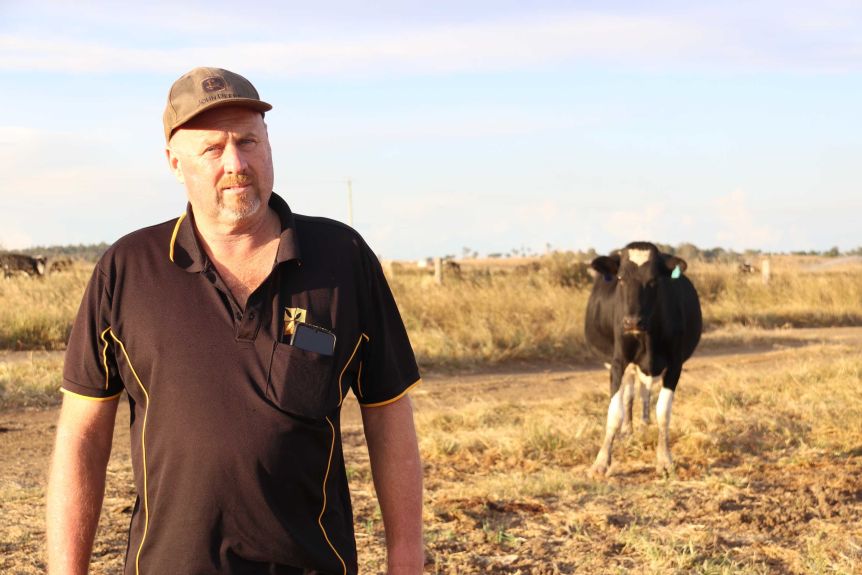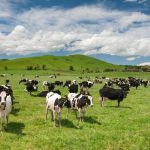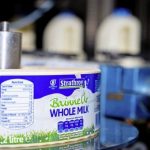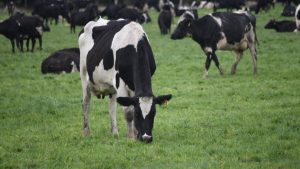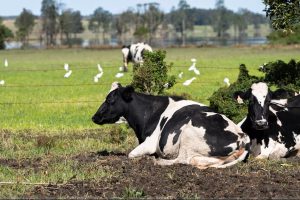
Key points:
One Queensland dairy farmer wants the Dairy Code of Conduct to change, particularly the rules around non-exclusive milk supply agreements
He says processors should not be able to stipulate a minimum supply amount nor drop the price
Federal Agriculture Minister David Littleproud agrees and says he is working with the ACCC to strengthen the code
Brad Teese tried to reach a non-exclusive milk supply agreement with dairy processor Lactalis earlier this year.
But he said the processor made it so difficult it was not economically viable for him to sign it.
“The terms of the dual supply [non-exclusive milk supply agreement] were that I had to send a minimum of 70 per cent of our farm’s milk to them at 10 cents a litre less [than the exclusive agreement],” he said.
“So I would have had to sell the other 30 per cent of my milk for 93 cents a litre just to equate to the same as their exclusive supply contract [of about 71.5 cents a litre].”
The Dairy Code of Conduct “does not prohibit processors from requiring farmers to provide a minimum volume of milk”, according to the Australian Competition and Consumer Commission (ACCC).
Mr Teese said that needed to change to make non-exclusive milk supply agreements viable.
“I’m afraid with any processor being able to quote you a minimum supply amount and have such a drastic drop in the price, it’s a worthless piece of paper,” he said.
“The dual supply is worthless unless there is very little difference in price to the exclusive contract.
“The supply amount needs to be negotiated between the supplier and the processor, otherwise we are still being dictated to. And the code has made no difference.”
Lactalis declined to comment.
Government vows to ‘square up’
Federal Agriculture Minister David Littleproud said he was working with the ACCC to strengthen the code.
“If there are gaps in the code that need to be fixed, I’ll fix them,” Mr Littleproud said.
“Obviously the conduct of some of these processors isn’t glowing.
“They proved it before the code [was implemented and] these examples shine a light on their behaviour.
“So if they’re going to continue to do this and be morally bankrupt about it, well, someone’s going to square up with them at some point.”
Mr Littleproud said he did not believe a processor should be able to stipulate a minimum supply amount, even though it was currently permitted under the code.
“This is something that the processor has market advantage of that in other commodities they don’t because they know exactly how much milk you’re producing, because they’re picking it up,” he said.
“And, in my mind, they are using that information against the dairy farmer and I have raised that with [deputy chair of the ACCC] Mick Keogh.
“If I’m a grain grower in Goondiwindi, AWB doesn’t know how much wheat I produce on my farm. They don’t know that I might have 10,000 tonnes in my silos.
“If I only want to sell them 6,000 tonnes … well, that’s my choice.
“So I’ve asked the ACCC to investigate what these [dairy] processors are doing and to give me some advice about that aspect of the code and whether that’s a gap because, in my mind, I don’t see that that is fair.”
Mr Littleproud said he did not believe a processor should be able to significantly drop the price in a non-exclusive milk supply agreement.
“Really though, [the code] is there simply to guide how [processors] should act … but really we shouldn’t have to do this,” the Agriculture Minister said.
“Everyone is just tired and fatigued about how dairy farmers have been treated by supermarkets and processors.
“They’ve had a gutful. They just want them to do the right thing.”
Mr Littleproud said he expected the ACCC would provide him with recommendations on how to fix the gaps in the code soon.
